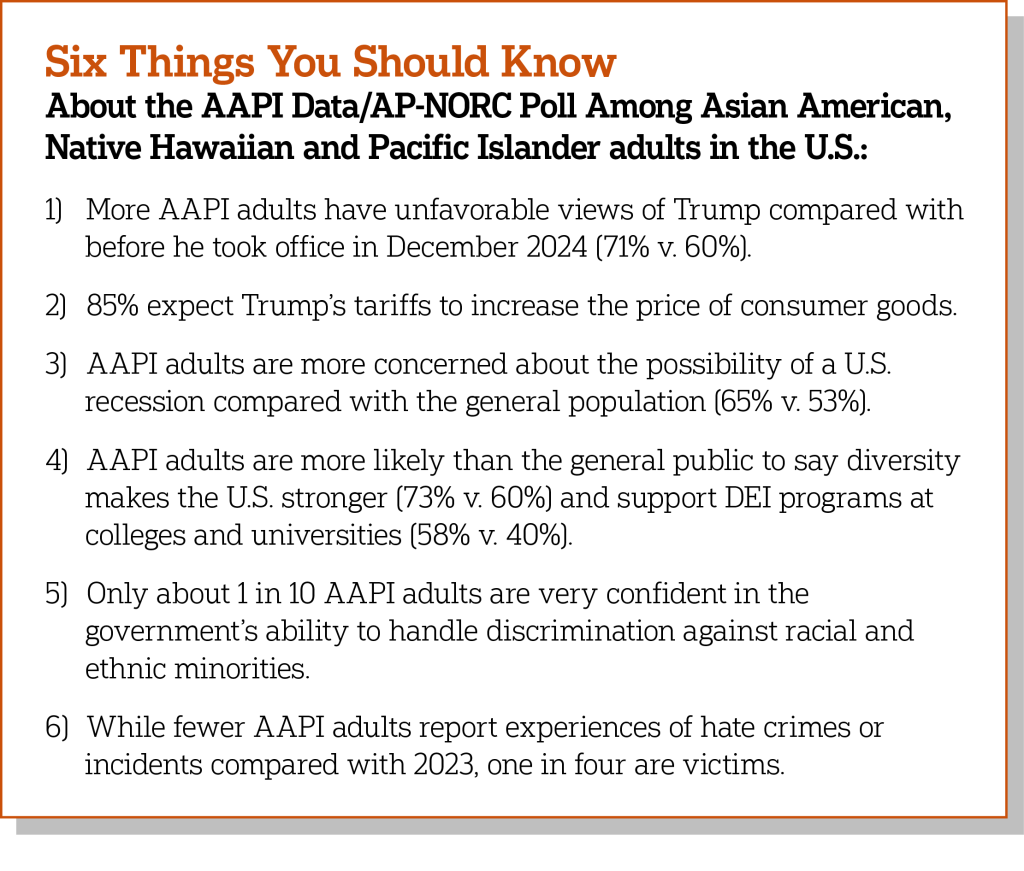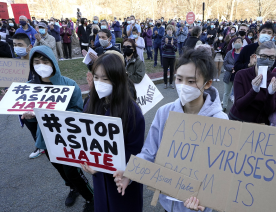
July 23, 2025
More AAPI adults have unfavorable views of President Trump compared with their views before he took office in December 2024 (71% v. 60%) according to a new AAPI Data/AP-NORC poll. And a majority also have unfavorable opinions of JD Vance (61%), Elon Musk (64%), and Robert F. Kennedy Jr. (57%). Dislike of Trump and Vance is higher among AAPI adults than the general population.
Amid ongoing changes to U.S. tariff policy under the Trump administration, most AAPI adults expect the price of goods will increase and their availability will decrease. The majority express deep concern about the cost of goods and the possibility of a recession.
About half of AAPI communities say Trump’s tariffs will lead to a decrease in the number of jobs in the U.S., while only a quarter think the tariffs will result in job growth, fewer than the general public (24% vs 40%). AAPI adults are split on what the tariffs will do to U.S. manufacturing.
Like the general public, most are very concerned about the cost of groceries and the possibility of a recession. And about half of AAPI adults feel the same about large consumer purchases, the cost of products at minority-owned small businesses and ethnic grocery stores, the availability of consumer goods, and the cost of eating out at ethnic restaurants. Fewer are concerned about the costs of shopping on direct shipping e-commerce sites.
Many AAPI adults describe key U.S. trading partners as not friendly or enemies of the U.S., including China (87%), Mexico (44%), and India (40%). AAPI adults are more optimistic about the country’s relationship with Canada, with 70% describing them as close allies or friendly.
AAPI adults are unsure what the country’s role should be on the world stage: 38% believe the country should be less active, 37% think it should be more active, and 25% say its current level of involvement is about right. Still, compared with the general public, more want the U.S. to take a larger role in world affairs (37% v. 23%).
AAPI adults are more optimistic than the general population that diversity makes the country stronger (73% v. 60%). At colleges and universities, a majority also favor support services (66%) and scholarships (63%) for students from underrepresented groups, courses that teach about racism (62%), and diversity, equity, and inclusion programs (58%). Fewer in the general public agree with such measures.
AAPI communities are more divided about whether DEI programs have gone too far, not far enough, or been about right in colleges and universities, the federal government, corporations, or nonprofits.
When it comes to race and diversity issues in the U.S., about half of those in AAPI communities say racism is a very serious issue (53%) and another third say it is moderately serious. Seven in ten say they experience discrimination when they apply for jobs and shop in stores. Just over half say the same when dealing with the police and doctors. These findings align with the inaugural AAPI Data/AP-NORC Poll from October 2023.
Few are very confident in the government’s ability to adequately deal with discrimination in healthcare (15%), employment (12%), housing (12%), or law enforcement (11%).
Although reports of hate crimes or incidents among AAPI adults have declined since October 2023, one in four still report experiencing these issues in the past year. This includes 13% who faced racial slurs or verbal harassment and 7% who were threatened with violence.

The nationwide study was conducted by The AP-NORC Center for Public Affairs Research and AAPI Data from June 3-11, 2025, using the Amplify AAPI Monthly survey drawing from NORC’s Amplify AAPI® Panel designed to be representative of the U.S. Asian American, Native Hawaiian, and Pacific Islander household population. Online and telephone interviews were offered in English, the Chinese dialects of Mandarin and Cantonese, Vietnamese, and Korean with 1,130 Asian American, Native Hawaiian, and Pacific Islanders aged 18 and older living in the United States. The margin of sampling error is +/- 4.7 percentage points.







